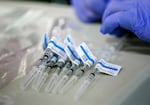Pregnant people with COVID-19 are more than twice as likely to develop severe COVID-19 as people who are not pregnant.
Although the vaccines against COVID-19 have been proven to be safe and effective and are widely available, the COVID-19 death rate for pregnant people has been climbing according to the Centers for Disease Control and Prevention. And although vaccination rates have risen slightly in recent weeks, just 31% of pregnant U.S. residents were vaccinated at the start of September.
Last week it issued an advisory recommending “urgent action” to increase vaccination rates in people who are pregnant, recently were pregnant, or are hoping to become pregnant. Pregnant people are also eligible to receive COVID-19 booster shots.

COVID-19 vaccine preparation at a drive-thru vaccination clinic at Portland International Airport, April 9, 2021. The clinic is a joint operation hosted by Oregon Health & Science University, the Port of Portland and the American Red Cross.
Kristyna Wentz-Graff/ OPB
“When we look at our patients who we admit for delivery, those who have COVID-19 are five times more likely to go to the ICU, 14 times more likely to need to be intubated, and 15 times more likely to die during their hospitalization than those who do not have COVID-19,” said Dr. Emily West, an obstetrician and gynecologist with Kaiser Permanente Northwest.
Babies born to someone with COVID-19 are more likely to be premature. West said physicians may induce delivery in COVID-19-positive patients for the safety of the parent and the child.
Late-term pregnancy is demanding on a parent’s heart, circulatory system, and lungs — and so is COVID-19. West said delivering babies pre-term can sometimes help take that stress off of a patient’s body, which could save the life of the parent or the child.
“We always want to avoid pre-term delivery, but in some of these cases that is going to be for the benefit of the mom and baby,” she said.
There are multiple reasons pregnant people are at higher risk of COVID-19 complications. Some are simple: having a baby is hard on your body, and so is COVID-19. COVID-19 also increases the risk of certain cardiovascular conditions like blood clots, and so does pregnancy. For many diseases, pregnancy is considered a pre-existing condition that can put patients at increased risk, and COVID-19 is no different.
Our immune systems evolved to detect and attack things that aren’t a part of our body, including embryos. When a person becomes pregnant, their immune system undergoes a series of changes that help protect the fetus from attack. It can also leave pregnant people more vulnerable to severe infection, which COVID-19 vaccinations protect against.
At the same time, a pregnant person shares immune cells with the fetus. Through the placenta, birth, and breastfeeding, a baby can receive antibodies from the parent, including those that protect them from COVID-19.
Studies have shown that if an expectant parent is vaccinated for COVID-19, almost all of their babies will be born with protective antibodies, West said. That’s important, since infants seem to be at higher risk from COVID-19 than school-aged children.
Shifting opinions
West said that at the start of the year, her patients’ attitudes towards vaccinations were varied.
“I’ve had patients across the spectrum, some who were excited and ready to go ahead and get vaccinated as soon as they became available, and then those who are very concerned about potential risks,” West said. She said she encourages patients to weigh that against the very real risks of contracting COVID-19 while pregnant.
The CDC initially declined to advise for or against the COVID-19 vaccination when pregnant, because although there was reason to expect the vaccine would be safe during pregnancy, pregnant people were not included in early trials. But as of early September, over 150,000 pregnant people have safely received a COVID-19 vaccine while pregnant, and complications are rare. Still, vaccination rates remain low.
But West thinks there’s a large group of pregnant people who might be willing to take the jab, given a bit more information.
“I definitely have patients that I’ve been seeing over time throughout their pregnancy, who, you know, have follow-up questions and are starting to understand more about the vaccine, and have started to become more willing to receive it,” West said rising case rates locally and across the country might also be making some pregnant people less vaccine-hesitant.
West also said that anecdotally, many patients who are skeptical of the COVID-19 vaccine have been willing to receive other vaccines recommended during pregnancy, like the flu shot and the vaccine against whooping cough.
“That’s another opportunity to educate them,” West said. In the long slog to vaccinate as many people as possible, pregnant people are still a largely untapped population.
“Fortunately I still have patients each week — one just yesterday — who said, ‘you know, I’m ready to go ahead and get my shot,’” West said. “So it’s definitely worth having those conversations.”